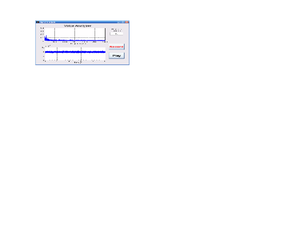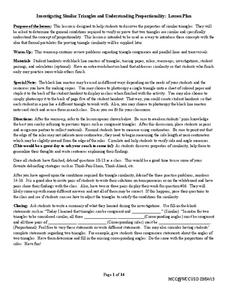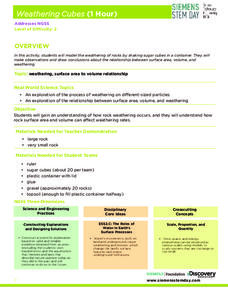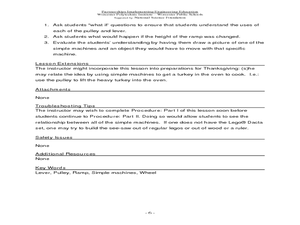EngageNY
Making Scale Drawings Using the Ratio Method
Is that drawn to scale? Capture the artistry of geometry using the ratio method to create dilations. Mathematicians use a center and ratio to create a scaled drawing. They then use a ruler and protractor to verify measurements.
Curated OER
Back To the Basics: Measurement
Lead the class in a review of the basic concepts and procedures involved in measuring length, weight, and volume. After whole group instruction, small groups and individuals practice measuring by completing a variety of fun activities...
EngageNY
Making Scale Drawings Using the Parallel Method
How many ways can you create a dilation? Many! Individuals strengthen their understanding of dilations by using various methods to create them. The new technique builds on pupils' understanding of the ratio method. Using the ratio,...
Curated OER
Ruler and Magnifying Fun
First graders investigate objects using rulers and magnifying glasses. They record their observations using a data-recording sheet and write a characteristic for each item they observe. They use the ruler to solve math problems.
Curated OER
Planning a Garden Using a Grid
Third graders plan for a garden. In this garden planning lesson plan, 3rd graders investigate the use of a grid to accurately map out and plan for a vegetable garden. Students predict the space requirements for different vegetables.
PBS
Frame Yourself: Area and Perimeter
Elementary schoolers are arranged in pairs and view the video Math Works: Measurement: The Difference Between Perimeter and Area. They discuss any prior knowledge they have of the term perimeter and then brainstorm together what the...
Curated OER
Using Your Marbles - Volume Measurement and Reporting
Demonstrate how to measure the volume of liquids and solids immersed in liquid to your class. They observe a teacher-led demonstration, and in small groups construct a data table that demonstrates how many marbles were used and the...
Curated OER
Does The Type of Mulch Used Affect Plant Growth?
Students measure, record and graph the plants they grow in a controlled setting. They feed and water the plants as needed and use the scientific method to evaluate the growth.
Curated OER
Measuring Yourself Using the Metric System
Students measure using the metric system. In this geometry lesson, students solve problems using grams, meters and liters. They convert between the US units of measurements and the Metric System.
Curated OER
Lesson 2: Measurement Tools
Elementary schoolers examine the uses of rulers, scales, and measuring cups. They determine the criteria for the use of each tool and visit different areas of school to find items that can be measured with these tools. Everyone takes...
Curated OER
Measuring to the Nearest Foot
Second graders measure and record the length of five different objects around the room. They watch as the teacher measures items using a ruler. A ruler is a foot long. Everyone listens and watches as the teacher continues to teach that a...
Curated OER
My Foot and the Standard Foot
Young mathematicians put one foot in front of the other as they learn how to measure length in an elementary math lesson. Using paper cutouts of their own feet, children measure classroom objects as they discover the importance of...
Curated OER
When a Ruler is Too Short
Students measure distances using parallax. In this math activity, students explain how this method helped astronomers with their studies of the solar system. They determine the length of their arm using parallax and compare it with other...
West Contra Costa Unified School District
Investigating Similar Triangles
Let your use of the resource be in proportion to its usefulness. Pupils investigate similar triangles by measuring side lengths and considering given angle measures. The results of the investigation help develop generalizations about...
EngageNY
The Distance from a Point to a Line
What is the fastest way to get from point A to line l? A straight perpendicular line! Learners use what they have learned in the previous lessons in this series and develop a formula for finding the shortest distance from...
Discovery Education
Weathering Cubes
Weathering is not necessarily a result of the weather. Scholars conduct an experiment to explore the effect of surface area and volume on the weathering process. They create their own sugar cube rocks using the same number of cubes—but...
Curated OER
Identify and use Simple Machines
Students are exposed to simple machines and their uses. In this everyday tools lesson, students watch a demonstration on how a lever, pulley, ramp, and wheel works. Students are given the opportunity to use hands-on techniques to explore...
Curated OER
Mapping a Site Using a Coordinate Plane
Learners map their playground as if it were an archeological site. They locate objects on the playground and determine their location using coordinate points. A related lesson is Coordinate Grid: Mapping an Archeological Site.
BBC
Sorting and Using Materials
First and second graders see that everyday objects are made from a variety of materials. They interact with objects such as keys, plastic spoons, a wooden ruler, a towel, and a plastic bag. A discussion ensues which leads them to...
Curated OER
Exploring Height with Abe Lincoln
Learners examine a life-size count out of Abraham Lincoln to get a visual comparison of their height and Lincoln's. They work in pairs and trace each other's body and measure from head to toe in inches using a ruler. They then subtract...
Curated OER
How Tall is that Tree?
Students use their feet to measure distance between themselves and a tree trunk. For this distance lesson, students use the number of steps, and string to measure distances and height of the tree. Students can get the tree...
Curated OER
The Fall of the Ruler
Middle schoolers determine their reaction time using a ruler. In this Physics lesson, students calculate the class' means and variances. They plot the graph and analyze if there are outliers.
California Academy of Science
What's on a Penny?
As a lesson on scientific observation, have your class investigate the features of a penny and a nickel. Working in pairs, they practice writing detailed descriptions using their senses and a ruler to gather information. This is an...
EngageNY
Looking More Carefully at Parallel Lines
Can you prove it? Making assumptions in geometry is commonplace. This resource requires mathematicians to prove the parallel line postulate through constructions. Learners construct parallel lines with a 180-degree rotation and then...
Other popular searches
- Measuring Using a Ruler
- Using a Ruler Inches
- Measurement Using a Ruler
- Using a Ruler Activity
- Maths Using a Ruler
- Measurements Using a Ruler
- Measuring Using Ruler
- Measuring Length Using Ruler
- Math Using a Ruler























